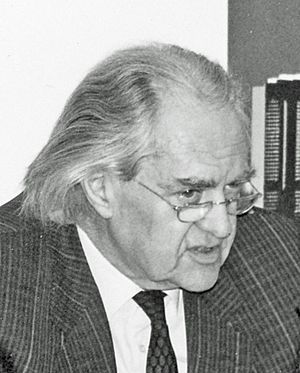Hilmar Hoffmann facts for kids
Quick facts for kids
Hilmar Hoffmann
|
|
|---|---|

Hoffmann in April 1989
|
|
| Born | 25 August 1925 |
| Died | 1 June 2018 (aged 92) Frankfurt, Germany
|
| Education | Folkwang Hochschule |
| Occupation |
|
Hilmar Hoffmann (born August 25, 1925, died June 1, 2018) was a very important German person. He was a director for plays and films. He also worked in politics, focusing on culture. He taught at universities too.
Hoffmann started the famous International Short Film Festival Oberhausen. For many years, he was a powerful city leader in Frankfurt. There, he created the Museumsufer, which is a group of 15 museums along a river. One of these was the Jewish Museum Frankfurt. He also led the Goethe-Institut, which promotes German culture worldwide. His main idea was "Culture for All," meaning everyone should have access to art and learning.
Contents
Hilmar Hoffmann's Early Life and Career
Hilmar Hoffmann was born in Bremen, Germany, on August 25, 1925. His father was a merchant who traded goods with other countries. Hilmar went to school in Lünen and later in Oberhausen.
During World War II, he was a paratrooper. He became a prisoner of war in the United States. After the war, he returned home in 1947. He then studied directing at the Folkwang University of the Arts in Essen. He earned his diploma there.
Starting His Cultural Journey
Hoffmann began his career as an assistant director at the Theater Essen. In 1951, he became the head of the Volkshochschule in Oberhausen. This is like an adult education center. He was the youngest person to hold this job in Germany at the time. He stayed in this role until 1965.
In 1954, he created the International Short Film Festival Oberhausen. This festival shows short films from all over the world. He directed it until 1970. From 1965 to 1970, he was in charge of culture and social issues for the city of Oberhausen. During these years, he also taught at the Ruhr University in Bochum.
Building Frankfurt's Museum Riverbank
From 1970 to 1990, Hilmar Hoffmann was a city councilor in Frankfurt. He was responsible for culture and leisure activities. He worked hard to support new art groups and street theater. He also helped open 30 libraries in different parts of the city.
The Famous Museumsufer
One of his biggest achievements was creating the Museumsufer (Museum Riverbank). This project added 15 new museums along the Main River. The well-known Städel Museum was at the heart of this new museum area. Hoffmann helped make Frankfurt a city known for its culture, not just business.
He started the Jewish Museum Frankfurt, which was the first independent Jewish museum in Germany after the war. He also helped create the German Architecture Museum. He even opened the city's first public cinema. The Museum Angewandte Kunst (Museum of Applied Art) was designed by a famous architect, Richard Meier. It includes an old villa from 1803.
In 1985, The Washington Post newspaper quoted Hoffmann saying, "We are not just building museums, but a whole program." This showed his big vision for culture. He also supported the Mousonturm, a place for alternative art. He helped restore the old opera house, turning it into a concert hall called Alte Oper. During his time, the Frankfurt Opera House became one of the best in Germany.
Leading the Goethe-Institut
From 1993 to 2001, Hilmar Hoffmann was the president of the Goethe-Institut. This organization promotes German language and culture around the world. He worked during a time when the institute needed to grow, especially in Eastern Europe. He also faced challenges with less money available.
He taught about film and cultural politics at universities in Bochum, Marburg, and Frankfurt. He was also a visiting professor in Jerusalem and Tel Aviv. Hilmar Hoffmann passed away in Frankfurt on June 1, 2018.
Hilmar Hoffmann's Lasting Impact
When Hilmar Hoffmann retired from the Goethe-Institut in 2002, Germany's President Johannes Rau praised him. He said Hoffmann was a person who argued for his beliefs and was also very good at getting support for his ideas.
After Hoffmann's death, Germany's culture minister, Monika Grütters, said that Germany had lost one of its most important cultural leaders. She said he was great at inspiring people, no matter their political views. Ina Hartwig, who took over Hoffmann's role in Frankfurt, said he was known for wanting everyone to be able to enjoy culture. She also mentioned his work in creating the Museumsufer. She said he was one of the most important cultural politicians in all of Germany.
Awards and Honors
Hilmar Hoffmann received many awards for his work:
- 1976 – Filmband in Gold for his long and great achievements in German film.
- 1988 – Helmut-Käutner-Preis
- 1988 – Friedrich-Stoltze-Preis
- 1990 – Großes Bundesverdienstkreuz with star (a high German honor).
- 1997 – Honorary Doctorate from the Otto-Friedrich-Universität Bamberg.
- 2002 – Das Glas der Vernunft
- 2003 – Waldemar von Knöringen Prize
- 2007 – Verdienstorden des Landes Nordrhein-Westfalen
- 2012 – Hessischer Kulturpreis

